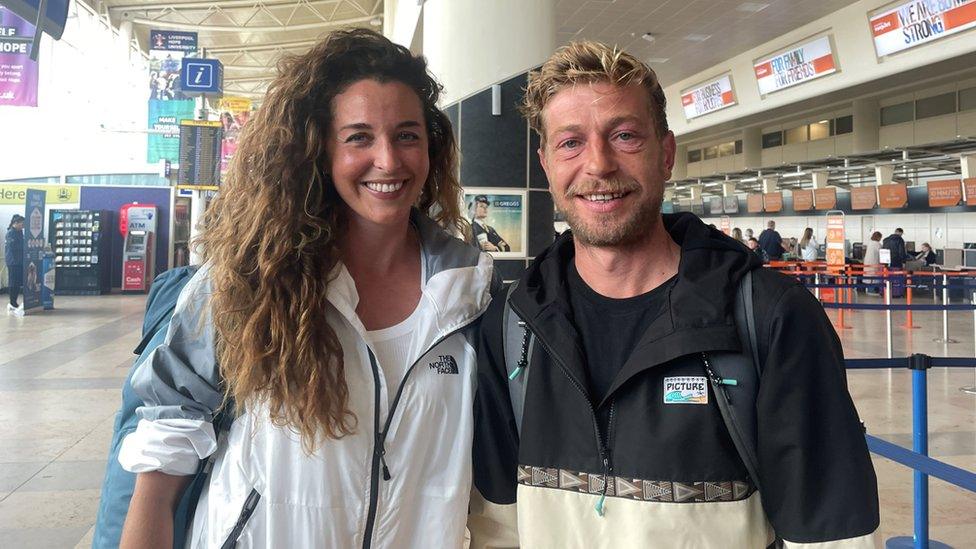Nats air traffic control fault: Experts reflect on three days of chaos
- Published
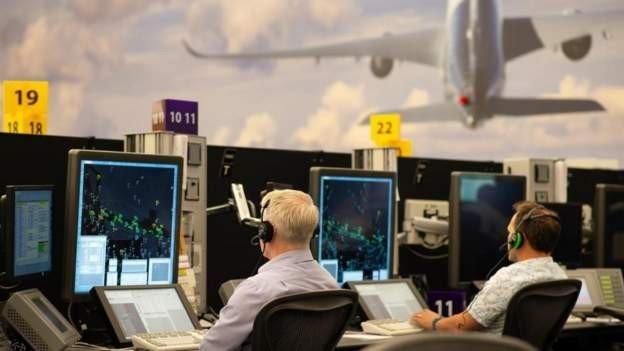
Air traffic controllers are trained for switching to a manual service but it is a rare occurrence
More than 2,000 flights cancelled, hundreds of thousands of passengers delayed or stranded, and airlines facing compensation payments in the millions.
How did a fault in the UK's air traffic control system that was fixed within four hours cause such prolonged chaos?
It was a bank holiday Monday - a classic "big travel day".
Some families jetted from UK airports for the final days of summer, while others flew back ahead of the return to school for most children.
Early news of delays at some airports did not cause much panic - they happen every day and, more often than not, are rectified almost immediately.
But a message from Scottish airline Loganair posted on social media site X, formerly Twitter, shortly before 12:00 BST suggested a bigger problem.
The airline said there was a network-wide failure of UK air traffic control computer systems.
Within half an hour, the problem was confirmed by Britain's National Air Traffic Services (Nats). It said in a statement it was experiencing "technical issues" and was restricting air traffic flow for safety reasons. It did not say how long it would take its engineers to find and fix the problem.
All flights could land safely. This was not a matter of life and death - but of frustration and expense, on a scale rarely seen in any setting.
Some planes already flying back to the UK turned around and landed. Others simply stayed on the ground.
Sports presenter Gabby Logan, in Budapest after the World Athletics Championships, said she was on a plane when passengers were told they could be held up for 12 hours.
Ex-air traffic controller describes what happened
What exactly had gone wrong was not being fully explained by Nats.
But Michele Robson - who worked as an air traffic controller, air traffic supervisor and safety manager from 1992 to 2016 at the London Area Control Centre in Swanwick - gave the BBC insider insight into the systems.
The failure in the air traffic planning system would have started about 08:30 BST, she says - several hours before Loganair's tweet.
A back-up system could have operated normally for another four hours, but those working on a fix would have been fully aware they were against the clock, and then later realised they did not have enough time.
"They decided to go manual. This means the flight planning assistants and ATC assistants input the flight data manually.
"This is something they do all the time but there is suddenly a lot more pressure on them," Michele says. It would have been a tense few minutes for the air traffic controllers when they went to "manual" - but it is a situation they train for.
She recalls reverting to a manual system just once in her career: "You have to make more phone calls but it's not the scene of panic. Whenever people came into our workspace they always said they were surprised by how quiet it is."
Watch: The day UK air traffic control went down... in 71 seconds
Aviation data firm Cirium was busy calculating the size of the problem. It said there were 3,049 flights scheduled to depart from the UK on Monday and a further 3,054 due to arrive.
Airlines and airports were by now issuing the standard advice for passengers to check the latest status of flights.
But there was still no indication of how long the problem would last.
Delays and uncertainties were having a big impact on some. Serena Hamilton, from Cookstown, County Tyrone, was meant to fly to Newcastle for a hospital check-up following a heart transplant last year - but realised she had no hope of getting there in time.
Airlines are hampered in how quickly they can get things back to normal during long delays because safety laws limit the number of hours staff can work. And if planes get stuck in one place, they may also miss their next scheduled flight from another country.
Companies were soon warning of outright cancellations. Passengers were scrambling to get on the next scheduled flight, either with the same airline or a competitor - all without knowing whether that next flight would also get stuck.
Among them were Adam Ashall-Kelly, 35, and his fiancee Christine Marriott, 36, who had their flight from Manchester to Verona cancelled and were starting to panic about their planned wedding at the weekend.

Christine and Adam were due to get married in Malcesine near Lake Garda
They were rebooked on a Wednesday flight but were not certain they or their guests would reach Italy. "There's a significant cost financially but, obviously for Christine and I, it's the stress and the inconvenience in what is meant to be a very exciting time," Adam said.
At 14:30 BST, Nats confirmed that flight plans were being inputted manually, which meant heavy restrictions on the number of flights in and out of the UK. It said it would fix it "as quickly as possible".
With airlines in the firing line from frustrated customers, many firms wanted a more detailed explanation from Nats.
Willie Walsh, director general of the International Air Transport Association and the former boss of British Airways, said: "Nats has crucial questions to answer about their responsibility for this fiasco.
"The failure of this essential service is unacceptable and brings into question the oversight of the Civil Aviation Authority (CAA) who are required to review the Nats resilience plan under the terms of its licence."
Good news arrives - but passengers still stuck
The good news that passengers were waiting for came at 15:30 BST, when Nats announced: "We have identified and remedied the technical issue affecting our flight planning system this morning."
It said it would be working closely with airlines and airports as it got things back up-and-running and that it was "sincerely sorry for the disruption".
Even though the outage lasted less than four hours, it was clear the knock-on effect would last days.
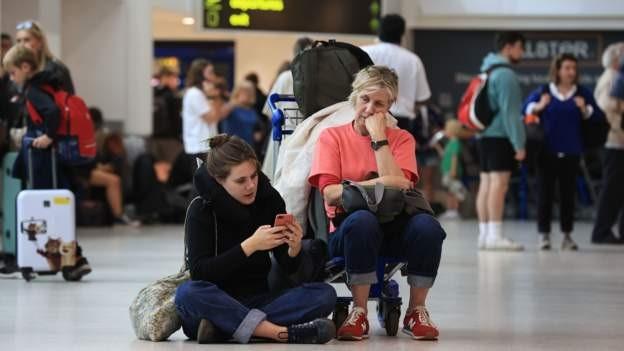
Passengers at Belfast International Airport sat on the airport floor to wait for flight news
Airlines, who could now plan with more certainty for the next few days, continued to cancel flights by the hundreds to ensure those plans were achievable.
In total on Monday, 799 flights were cancelled departing UK airports (27% of all departures) and 786 flights were cancelled arriving into the UK (27% of all arrivals).
Passengers were rearranging their own plans - all the while educating themselves on what compensation they were entitled to.
An airline has a duty of care to provide food, drink and accommodation if delays stretch overnight. Some airlines arrange this themselves but others ask passengers to pay for things then claim money back.
Sarah Skellern, from near Preston, said that she, her husband and their two sons waited for six hours at Palma de Mallorca Airport before their Jet2 flight was cancelled. By then all local hotels had been booked out.

Sarah Skellern's children spent the night sleeping on the floor of Palma de Mallorca Airport
"I think finally about three o'clock my youngest was in tears, my older one had fallen asleep on my knee. We just put some towels down on the floor and went 'you know what, let's try and get some sleep'."
So what actually had gone wrong?
With dozens of similar stories being relayed to the BBC and other media organisations, there were tough questions being asked by Tuesday as to what had gone wrong.
Nats chief executive Martin Rolfe said the system failure was an "extremely rare occurrence" and he was confident that, if it ever happened again, it would be resolved "very, very quickly".
Asked by the BBC's transport correspondent Katy Austin to explain what had happened, he said: "Simply speaking, our systems received some data on an aircraft and it was unable to process it. That is incredibly rare - we process millions of flight plans every year, thousands every day.
"It is safer for us [in that situation] to revert to a manual system, that makes sure no data that is safety critical to people's travel can ever fall into the hands of a controller, and they can continue to operate at a lower capacity.
"Very occasionally… we end up with a situation which is not possible to fix immediately. While I agree it is not the service we want to provide, the priority is safety."
Former air traffic controller Michele Robson warns that there could be "another completely random set of circumstances" in the future that Nats and Rolfe were unable to predict.
And John Strickland, an independent air transport consultant, tells the BBC that Nats must improve its back-up procedures as it was "not acceptable for the entire system to grind to a halt".
"This is not a normal thing, it's a very rare thing. This process has worked over years handling an enormous number of flights. That's why it's imperative to look for a better outcome when there is a glitch," he says.
He acknowledged that if this had happened mid-winter, rather than a busy bank holiday, it would not have been so disruptive.
We do not know which airline sent the rogue data, he says - or whether that airline has done it before.
That might be for the best. "If Nats knew there was one company... there's an educational lesson to learn. But there's no need to point fingers in public," he says.
Even though air traffic control was back to normal on Tuesday and Wednesday, there were an additional 438 flights cancelled. And even when normal operations resumed, the agonising wait continued for previously grounded passengers, as there was simply not enough space on remaining flights.
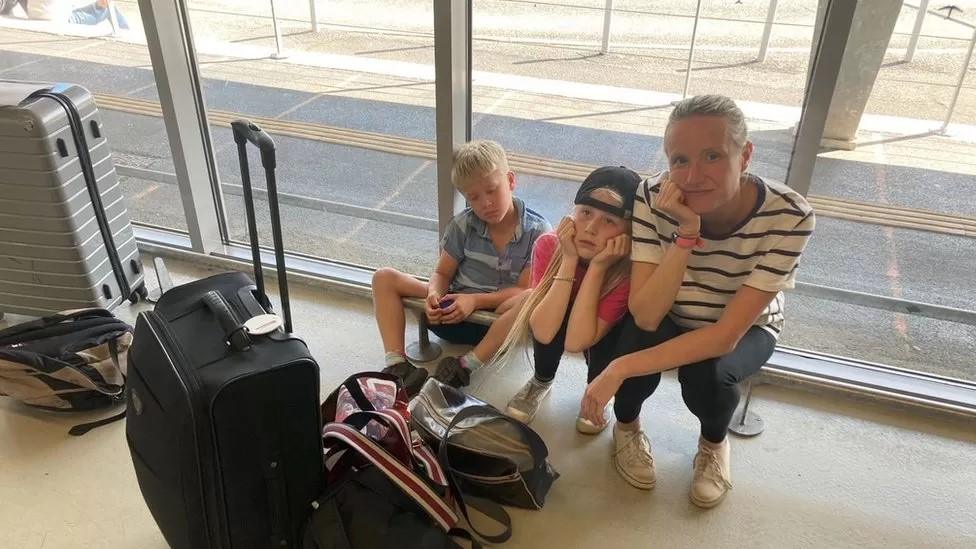
Rory Dollard's family were left waiting at Bergerac Dordogne Perigord Airport
Cricket journalist Rory Dollard said his family were stuck in France and the next available flight home was from a different airport - six days later.
Compensation bills were racking up.
A couple from Stourport, Worcestershire, said they had spent £2,000 on accommodation and alternative flights, and wanted full compensation from Ryanair.
After three days of trying to get back from Ibiza, Rob Ward also said he was about £2,000 out of pocket and that British Airways had told him that he would be reimbursed - after he got home.
There are suggestions that airlines may seek to get back some of that money from Nats.
And you can expect Nats to be back in the news on Monday, a full week after the fault.
In his BBC interview, chief executive Martin Rolfe said that Nats had launched a full investigation and would present initial findings to the transport secretary on Monday.
He was pressed by Katy Austin on whether the findings would be made public. He said it would.
Additional reporting by Marie Jackson
Related topics
- Published29 August 2023
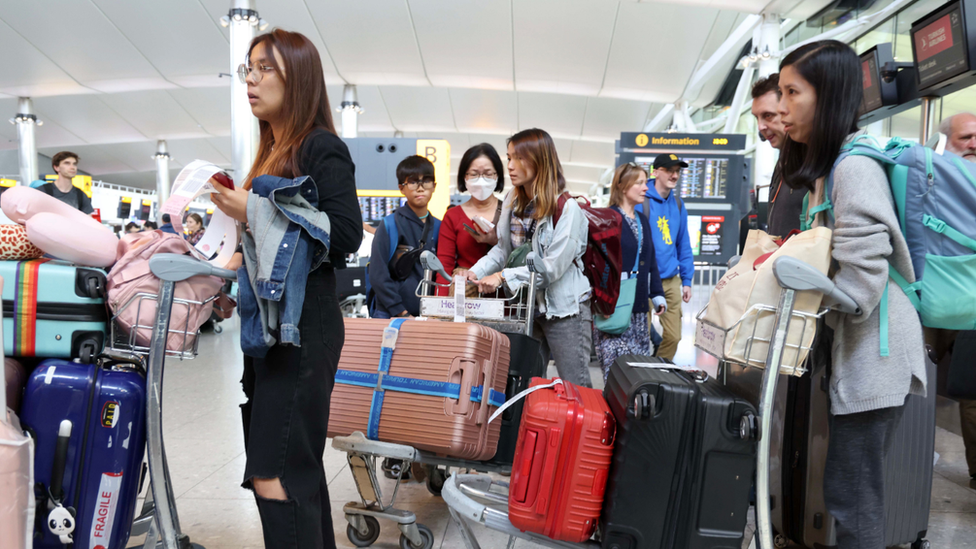
- Published28 August 2023
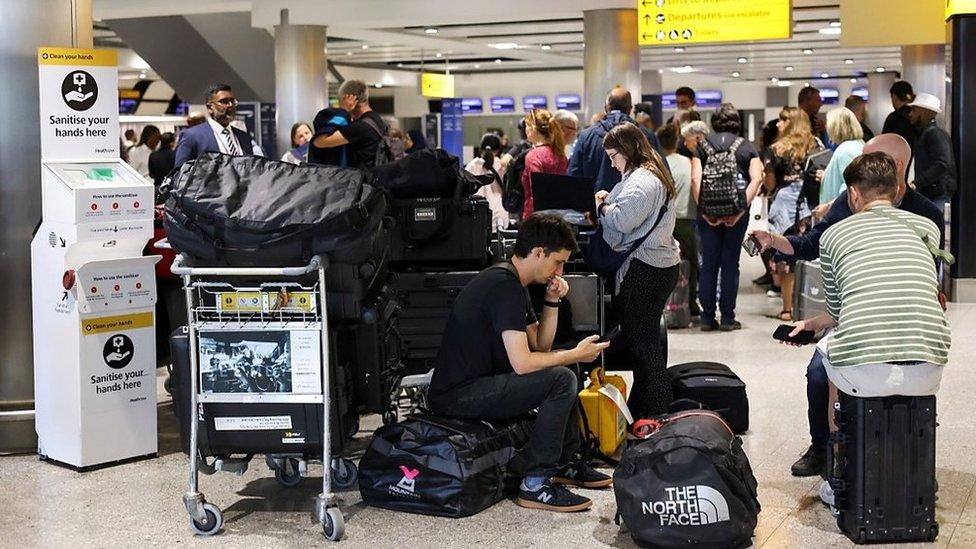
- Published29 August 2023

- Published29 August 2023
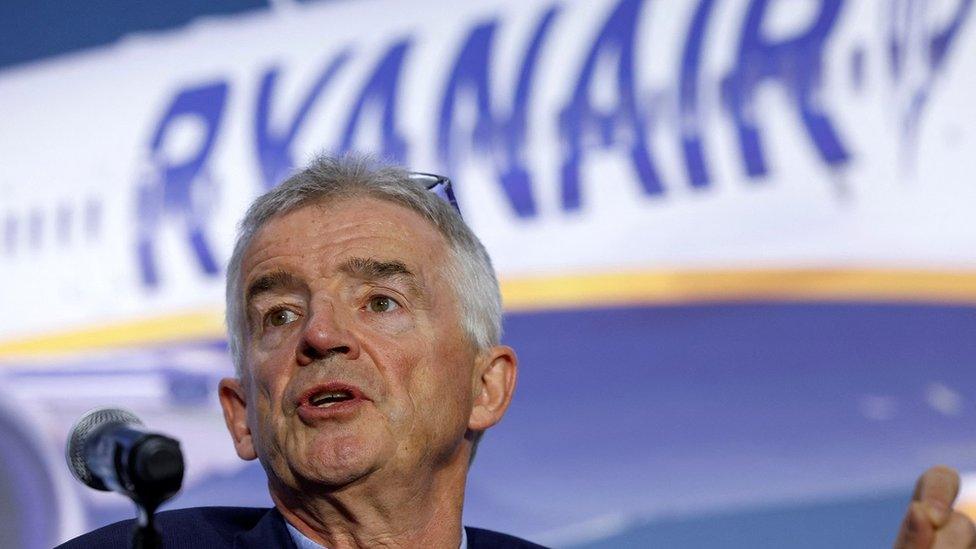
- Published29 August 2023

- Published29 August 2023

- Published28 August 2023
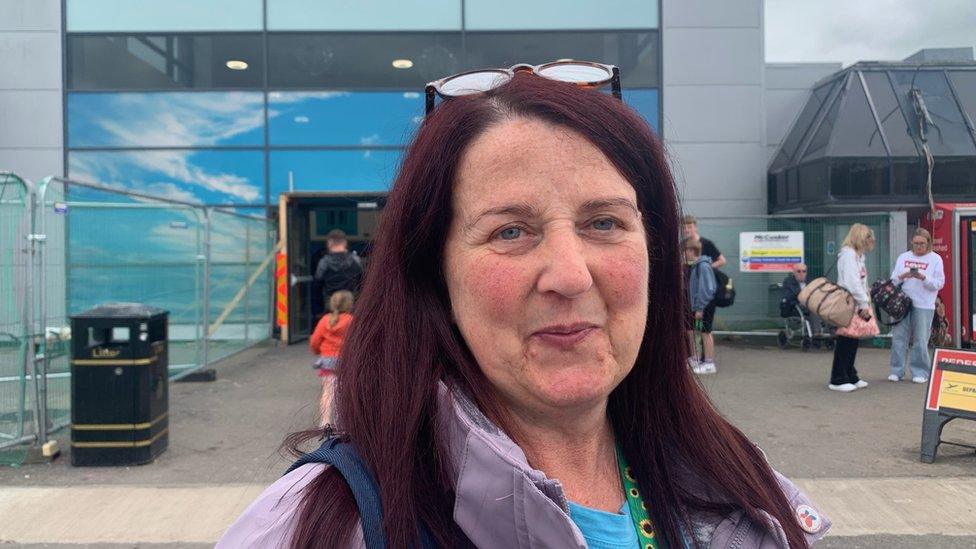
- Published30 August 2023

- Published30 August 2023

- Published31 August 2023
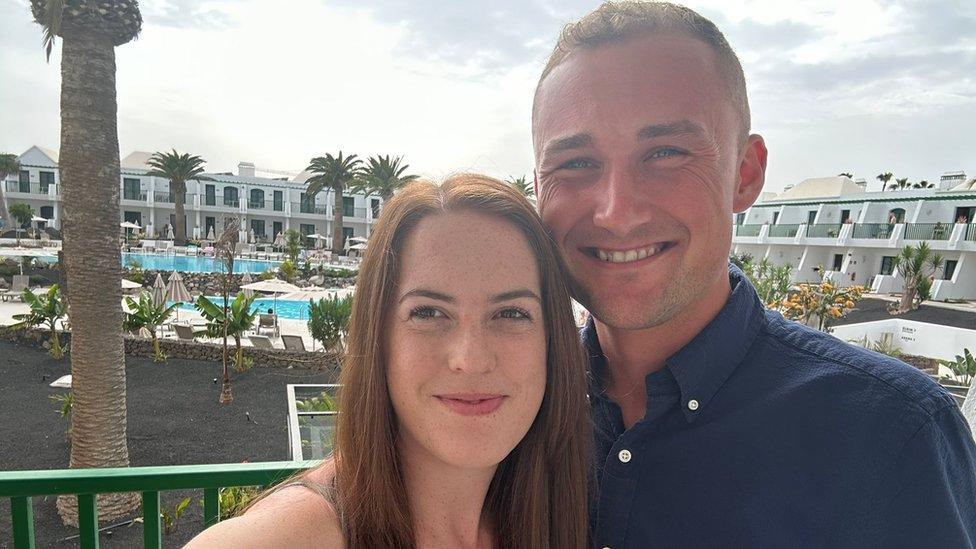
- Published30 August 2023
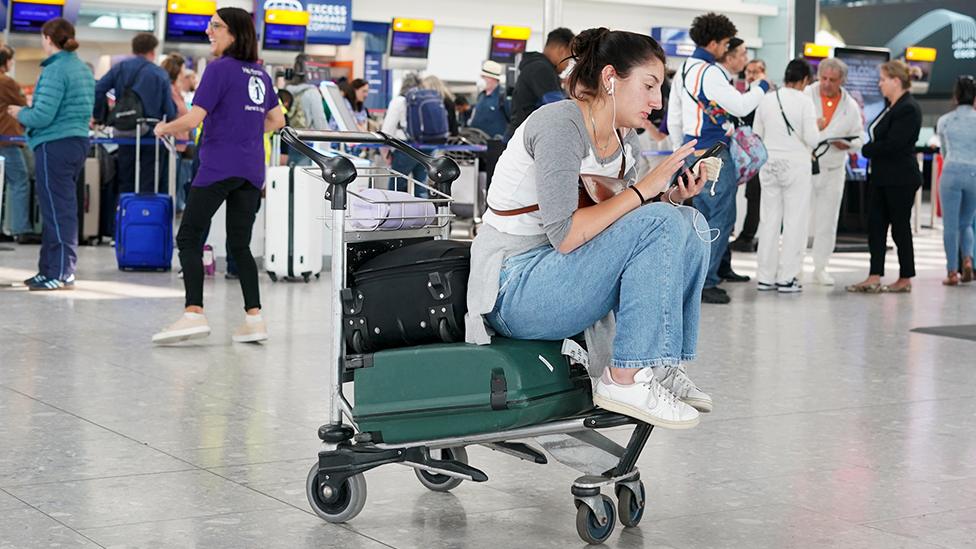
- Published30 August 2023
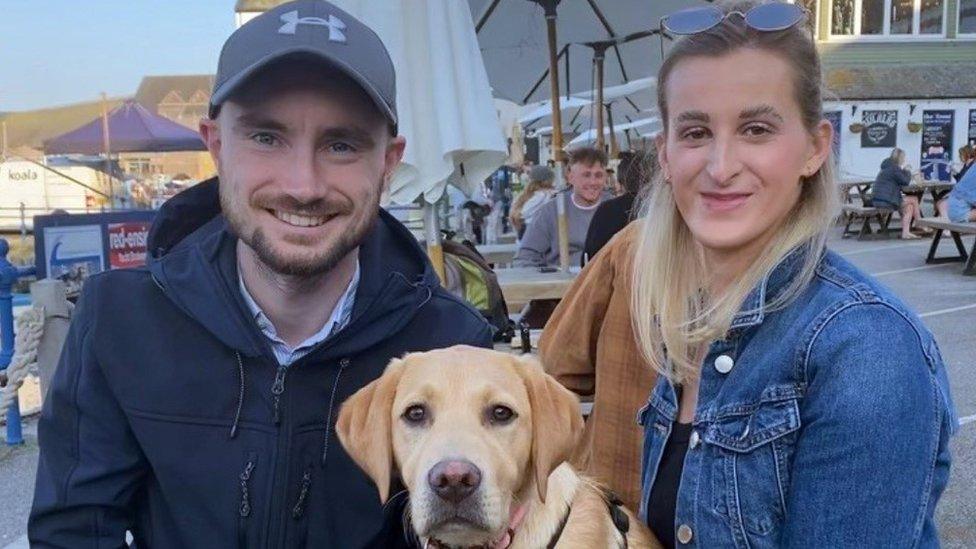
- Published30 August 2023
